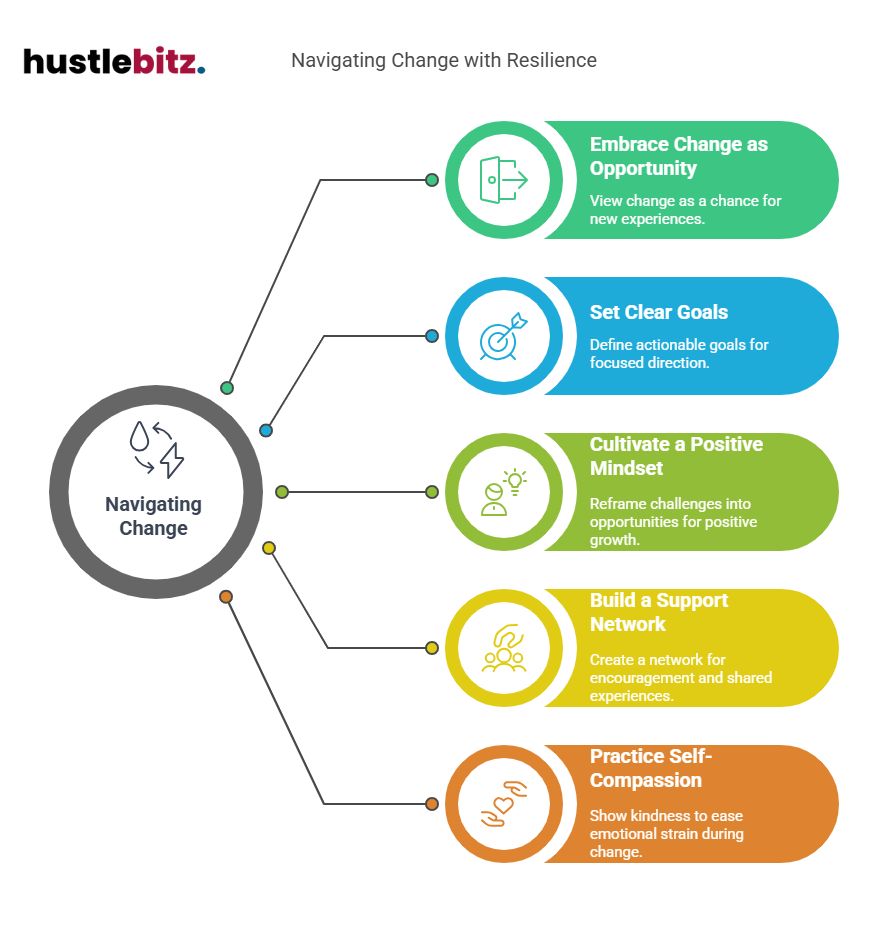To motivate yourself to embrace change and uncertainty, begin by shifting your perspective to view these elements as opportunities for growth. Acknowledge your emotions related to change and reframe challenges as chances to learn. Setting clear, incremental goals can foster a sense of achievement while building resilience. Seek support from networks to bolster your confidence and engage with the unpredictability of life. Cultivating a growth mindset will enhance adaptability and unlock hidden potential. By understanding these strategies, you can navigate transitions more effectively and turn uncertainty into a pathway for personal and professional advancement. More insights await.
Key Takeaways
- View change as an opportunity for growth, fostering a mindset that embraces new challenges and experiences.
- Set clear, actionable goals to provide direction and focus during transitional periods.
- Cultivate a positive mindset by reframing challenges as potential gains rather than obstacles.
- Build a strong support network to encourage risk-taking and share experiences during times of uncertainty.
- Practice self-compassion to ease the emotional strain of change and promote gradual adaptation.

Embracing Change for Growth
Embracing change is essential for personal and professional growth, as it allows individuals to adapt, learn, and ultimately thrive in an ever-evolving environment. Recognizing that change is not merely an obstacle but an opportunity is critical for those seeking power and influence. By reframing challenges as avenues for personal growth, individuals can cultivate a mindset that fosters resilience and adaptability.
The motivation to change is often sparked by an awareness of the potential benefits that lie beyond the discomfort of the unknown. Individuals who harness this motivation are better equipped to navigate transitions with confidence and assertiveness. They understand that adaptability is a key trait of successful leaders, enabling them to respond effectively to shifting circumstances and demands.
To facilitate this journey, developing robust coping strategies is paramount. These strategies may include setting clear goals, engaging in continuous self-assessment, and seeking mentorship or peer support. By actively pursuing personal development, individuals can reinforce their capacity to embrace change, transforming it from a source of anxiety into a catalyst for empowerment.
Ultimately, embracing change as an opportunity not only enhances personal growth but also positions individuals favorably within their professional domains. Those who master the art of adaptation are not merely surviving; they are thriving, leading others through uncertainty and emerging as powerful influencers in their fields.
Embrace change, and unlock the potential to elevate not just your career, but your very essence.
Overcoming Fear of Uncertainty

Overcoming the fear of uncertainty requires a conscious effort to shift one’s perspective, recognizing that the unknown often holds the potential for growth and new opportunities.
When we embrace change, we empower ourselves to navigate the complexities of life with confidence. The uncertainty that comes with change can be daunting, yet it is essential to understand that this discomfort is a precursor to transformation.
To effectively overcome challenges, one must first confront the fear of failure that often paralyzes action. This fear, while instinctual, can be reframed as a catalyst for resilience.
By teaching ourselves to view setbacks not as endpoints but as stepping stones, we cultivate a mindset that thrives in the face of adversity. Each challenge becomes an opportunity to learn, adapt, and emerge stronger.
Developing resilience is not merely about enduring difficulties; it is about actively engaging with them. When we approach uncertainty with curiosity rather than dread, we unlock our potential for innovation and success.
Embracing change entails a willingness to take calculated risks and to accept that failure is an integral part of the journey.
Through this transformative process, we cultivate a robust framework for decision-making that not only mitigates fear but also enhances our ability to lead in uncertain times.
Ultimately, overcoming the fear of uncertainty is not just about surviving; it is about thriving and asserting our influence in an ever-evolving landscape.
Accept Uncertainty and Change
Accepting uncertainty and change is a crucial step in personal development, as it allows individuals to navigate life’s inevitable transitions with greater ease and adaptability. Embracing uncertainty is not merely an acceptance of the unknown; it is a powerful assertion of one’s capacity to thrive amid chaos. By recognizing that change brings opportunities for growth, individuals can elevate their motivation levels and harness their inner strength.
The ability to embrace change is a testament to one’s resilience. When faced with uncertainty, powerful individuals recognize that the potential for advancement often lies just beyond the discomfort of the unknown. Rather than shying away from unpredictability, they strategically position themselves to leverage it as a catalyst for transformation. This mindset shift is essential; it empowers individuals to see beyond immediate challenges and focus on the long-term benefits that change brings.
Moreover, cultivating a proactive approach to uncertainty enhances personal development. It fosters a sense of agency, enabling individuals to take calculated risks and pursue new paths. Those who accept change are better equipped to adapt their strategies and refine their goals in response to evolving circumstances. By embracing the inherent unpredictability of life, they not only improve their motivation levels but also cultivate a robust framework for ongoing success.
Ultimately, accepting uncertainty is not an act of surrender but a declaration of one’s readiness to evolve. In doing so, individuals position themselves as architects of their destinies, ready to capitalize on the possibilities that change invariably brings.
Motivation Amid Life Transitions

Navigating life transitions requires a focused approach to motivation, as individuals must harness their inner drive to adapt and thrive in new circumstances. Life transitions often bring uncertainty, but embracing change is essential for self-improvement and personal growth.
To fuel your motivation during these pivotal moments, consider implementing the following strategies:
- Set Clear Goals: Define specific, measurable objectives that align with your vision for the future. This clarity will provide direction amidst chaos.
- Cultivate Resilience: Develop a mindset that views challenges as opportunities for growth. Resilience empowers you to face adversity with confidence.
- Surround Yourself with Support: Engage with a network of individuals who inspire and uplift you. A strong support system can make transitions feel less daunting.
- Practice Self-Compassion: Acknowledge that navigating uncertainty is inherently challenging. Treat yourself with kindness and patience as you navigate these changes.
In times of transition, maintaining motivation is crucial for embracing change. By actively seeking self-improvement and focusing on your goals, you position yourself to turn uncertainty into a springboard for advancement.
Adapting to Change Effectively

Effectively adapting to change requires a proactive mindset and strategic approaches that empower individuals to harness new opportunities for growth. Embracing change amidst uncertainty is not merely an option; it is a necessity for those seeking personal growth and resilience. The ability to navigate shifting landscapes with confidence is a hallmark of successful individuals.
To cultivate this adaptability, one must focus on key strategies that enhance motivation and fortify one’s capacity to embrace change. Below is a concise overview of effective approaches:
| Strategy | Description |
| Define Your Goals | Establish clear, actionable objectives to guide your transition. |
| Cultivate a Positive Mindset | Foster optimism to combat negative thoughts that arise during change. |
| Build a Support Network | Surround yourself with individuals who uplift and encourage your journey. |
| Embrace Continuous Learning | Seek knowledge and skills that align with your evolving circumstances. |
| Practice Self-Compassion | Acknowledge your feelings and allow yourself the grace to adapt at your pace. |
Finding Strength in Uncertainty

Embracing uncertainty can unlock hidden strengths and foster resilience in the face of change. When we confront the unknown with a positive mindset, we embark on a journey of self-discovery that ultimately reveals our capacity to navigate life’s complexities. Finding strength in uncertainty requires a deliberate shift in perspective, transforming fear into an opportunity for growth.
To cultivate resilience and empower oneself amidst the unknown, consider the following strategies:
- Acknowledge Emotions: Recognize and accept your feelings surrounding change; this is the first step toward harnessing your strength.
- Reframe Challenges: Shift your focus from what you might lose to what you can gain, allowing for new possibilities to arise.
- Set Incremental Goals: Break larger challenges into manageable tasks, fostering a sense of achievement and reinforcing your ability to adapt.
- Seek Support: Surround yourself with a network that encourages risk-taking and supports your journey through change.
Unlocking Potential Through Change

Unlocking potential through change requires a willingness to step outside one’s comfort zone and explore new opportunities for personal and professional growth. Change means confronting the familiar and embracing the unknown, a vital step toward realizing one’s true capabilities. Individuals who understand that change is an opportunity for growth and learning are empowered to transform challenges into stepping stones toward success.
Embracing change is not merely a passive acceptance; it demands a proactive mindset that seeks out and cultivates potential. Those who stay motivated during transitions often find themselves equipped with new skills and insights that significantly enhance their value in both personal and professional arenas. By systematically addressing the fears associated with change, individuals can unlock reservoirs of creativity and resilience previously underestimated.
Furthermore, the ability to adapt and thrive in the face of uncertainty is a hallmark of exceptional leadership. Leaders who model this behavior inspire their teams to engage with change actively, fostering an environment where innovation flourishes. This cultural shift not only leads to enhanced performance but also nurtures a collective vision of success that is aligned with evolving market demands.
Final Thoughts
Embracing change and uncertainty is essential for personal and professional growth. By reframing challenges as opportunities, setting clear goals, and cultivating resilience, you can navigate transitions with confidence and purpose. Building a strong support network and practicing self-compassion will help you remain motivated as you adapt to new situations. Ultimately, embracing uncertainty opens the door to discovering hidden strengths and unlocking potential, empowering you to thrive in an ever-changing world.




